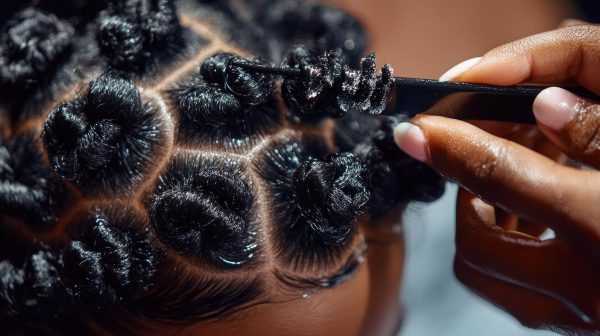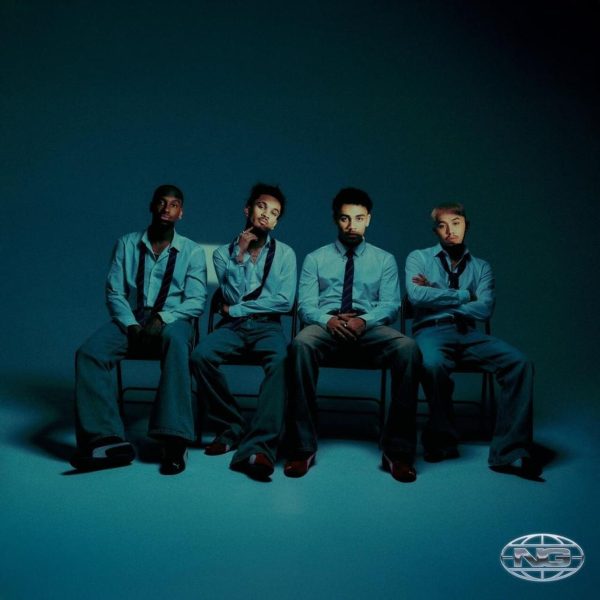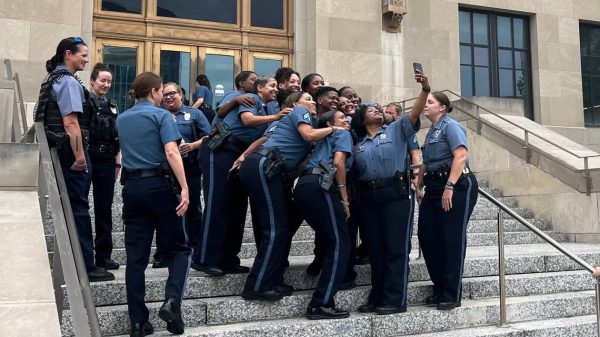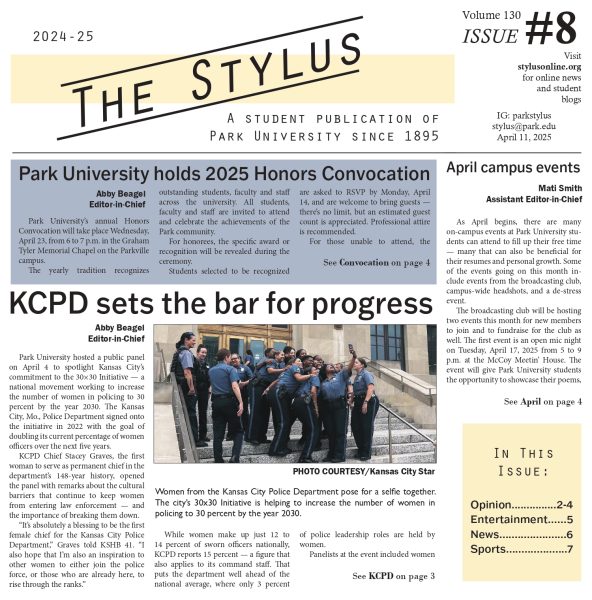Smashing stereotypes on Veteran’s Day
On Nov. 11, America celebrated Veteran’s Day. As a veteran, life is different and interesting. Being a woman veteran – well, it is even more different. Park University has a variety of women veterans on campus, from retirees to ROTC, students to staff, and everything in between.
Veteran’s Day is quite the experience for those who have been blessed to come home from the battlefield with their lives. As a veteran, I particularly enjoy experiencing the benefits of the 11th day of the 11th month, bouncing around from one restaurant to another, enjoying a free or discounted meal.
However, as a woman, publicly identifying yourself as a military member or veteran can lead to misconceptions and frustrating misidentifications. Heather Cole, a junior business management and finance major, also said she struggles with this. Cole joined the U.S. Army reserves in May of 2015, before becoming a ROTC cadet at Park two years ago.
“I have been told I don’t look like I would be in the Army,” Cole said. “If I mention the military many people automatically assume I’m a dependent.”
I retired from the U.S. Navy almost six years ago, and I still deal with the same thing. People think my husband was the one who was retired, not me. Even when my husband makes a medical appointment, the staff at the doctor’s office get confused when his “sponsor” – that’s military-speak for the person whose benefits you fall under – isn’t him.
I get strange looks at the grocery store when asking for the military discount. It’s like they can’t understand a suburban mom with a teenage daughter could be, herself, a veteran! It can be comical at times.
Cole has the same type of experiences, and, like me, uses them as her reason to push harder.
“I have run into some sexist people who did not believe in me … actions speak louder than words,” she said. “Once I show that I am capable of completing a mission just like any male could, I am treated like family, too.”
When I left my small town in New Jersey on Oct. 24, 1995, for the Naval Recruit Training Center, in Great Lakes, Ill., I hoped the next generation of women service members would have it a bit easier 24 years later. Unfortunately, it doesn’t seem like that is the case.
Any time I see a surprise homecoming video pop up on social media platforms, it seems it is always a man surprising his wife, his daughter or his son. It can get very discouraging. Women veterans are a minority, but we still exist, and we deserve as much visualization in this niche marketing as our male counterparts.
For Cole, it’s not the “male vs. female” so much, as changes in run-of-the-mill, everyday activities in the life of a service member on the verge of changing for the better.
“I personally believe the new Army physical training (PT) test will help allow me to get promoted on my skills and abilities,” Cole continued. “The new PT test will have six events with the same grading scale no matter your age or gender. This will help push females to show that they are capable to do the same as their male peers. They may have to train more, but a bullet doesn’t care if you are male or female.”
When a woman veteran hears those words: “Thank you for your service,” they take it in just a little bit more, because it means a little bit more. Hearing the words, “thank you for your service,” are so much preferred to: “what did your husband do in the military?”
Your donation will support the student journalists of Park University. Your contribution will allow us to cover our annual website hosting costs, freeing up other funds for equipment, printing and training.









susie w coit williams • Dec 17, 2019 at 5:48 pm
Yes! I cannot count the many times I am asked about my husbands military experience. I am the veteran. A huge thanks to all those people who thank me for my service. I was just doing my job and it is still hard to say, you are welcome!
Cher • Dec 17, 2019 at 4:02 pm
Thank you for YOUR service, Heather and gratitude to Cynthia Clark for the published story.
I am a U.S. Navy woman veteran – served 12.5 years active duty, 1981 – 1993. I was medically retired after a shortened tour in Korea. I’m also a Jersey girl! I spent most of my career in aircraft squadrons, on isolated duty and 1 overseas tour to Korea. Although the primary field in which I was trained involved “administrative” type duties (Yeoman and cross-rated to Journalist), I had MANY collateral duties which often consumed more time than my primary duties. I had two children while serving — both pregnancies while serving on shore duty. I always strive to set the bar higher — never just did the minimum on ANYTHING, to include the Navy’s physical readiness tests. As a woman, I was denied opportunities (I volunteered) to serve in combat positions and also to qualify and serve as a Navy SEAL. I BELIEVE that gender should never matter — if you are QUALIFIED to do a job, meeting the standards, you should be welcomed into the field. I seldom spoke about the challenges, pains and acceptance of toxic behavior toward me because of my gender, having had to keep silent because the consequences were too great! I have experienced all you speak of Heather, and more, which you perhaps have not revealed. My career and service is also dismissed by fellow veterans. I am told that I was just a “pencil pusher” or “how hard can it be to guard the Admiral’s door,” or “your job didn’t win us any wars,” etc. I have been treated horribly in veterans organizations and gotten hateful behavior from spouses of veterans (Auxiliary) who have been hostile and have harassed me to the point I left the organization. I was clearly told that they “had their claws out” and that they “didn’t want me around their husbands.” Mind you, I’ve been married for 37 years! I still find it difficult to fit in with the civilian workforce because I am very much an “A” type personality and very driven; I like to take action not just talk about it! And… I am very authentic and I walk the talk! I’ve been knocked down a lot in my life and it’s just becoming harder to get up as quickly as I used to do, yet, I will keep fighting for EQUAL acknowledgement of my service and EQUAL respect as a human being. We all took the same oath and our careers led us on different paths in servitude of our country. I have had trauma, too, but I have to walk around with a smile on my face and pretend life is grand because people don’t seem to see me or to care to ask me about my service. They seem to believe that what I did to serve my country was not important; therefore, I am invisible to them. I am one of the most patriotic individuals in this country and have sacrificed more than most people care to know about. I would would still give ALL to preserve our Nation’s freedom and liberties. NO ONE has walked in my shoes and NO ONE can tell me they fully understand my experiences while serving in the military except for my fellow sisters -in-arms! NEVER underestimate the power of a woman! We are NOT invisible!